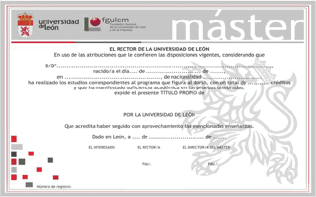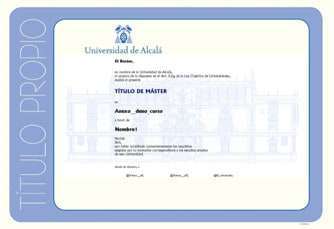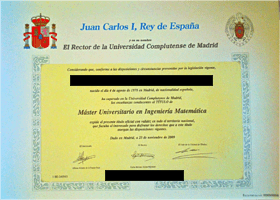Titulo de Propio vs. Titulo Oficial
May 28th, 2015

ACEI will be attending the upcoming the EAIE Conference in Seville to meet and collaborate with global leaders. The 29th Annual EAIE Conference and Exhibition in Seville, Spain will take place from 12–15 September 2017. The theme for the 2017 conference is ‘A mosaic of cultures’, bringing together global leaders to network and discuss issues regarding international trends and world education systems.
In the spirit of the EAIE conference in Spain, we want to explore how to evaluate and recognize the university degree titles of titulos propios and titulos oficiales from Spain. These titles are regarded as two different degrees by the Ministry of Education, Culture and Sports (Ministerio de Educación, Cultura y Deporte)/MEC of Spain inviting a closer look into understanding the differences between them.
This blog provides information on the titulo propios and titulo oficiales to help U.S. admissions officers and credential evaluators differentiate between the two in the evaluation and admissions decision-making process.
These titles are regarded as two different degrees by the Ministry of Education, Culture and Sports of Spain inviting a closer look into understanding the differences between them.
Historical Background
• In 1983, the Law of University Reform (Ley de Reforma Universitaria/LRU) enabled universities in Spain to offer and award their own degree programs, known as Titulos propios and gave universities greater autonomy in budgetary decision-making and curriculum development. (www.mecd.gob.es/portada-mecd/).
• Under the LRU, universities can continue offering degree programs officially recognized as titulos oficiales by the Ministry of Education, Culture and Sports (Ministerio de Educación, Cultura y Deporte)/MEC.
• The 1983 LRU also allowed for private universities to be established in Spain.
• In the 1983 LRU the MEC specified that universities offering titulos propios degrees must use terminology in the titles that clearly identifies it as a “propio” to avoid any confusion or overlap with official degree titles established and recognized by the government.
• Universities in Spain offer students who wish to complete their studies at the graduate level toward the Master’s degree the choice of either pursuing Máster/Master Oficial de Postgrado or the Máster Titulo Propio.
Definition
Titulo Propio
• The translation of the word “propio” means own, as in mine, and not yours.
• A título propio is a credential awarded on completion of curriculum set by the institution and awarded by the institution.
• The most common título propio qualification is Máster / Master; additional qualifications include Especialista / Specialist, Experto / Expert, Diploma, Técnico / Technician, and Graduado / Graduate.
• Título propio programs represent a minimum of 20 credits.
• Títulos propios are awarded by the rector of the individual university, rather than by the MEC.

Sample: Titulo Propio Máster awarded by Universidad de León

Sample: Titulo Propio / Titulo de Máster awarded by Universidad de Alcalá
Titulo Oficial
• The titulo oficial is awarded and recognized by the MEC on completion of prescribed studies at a university in accordance with Ministry-approved curriculum.
• Typically, a titulo official will include on the degree the name of King Felipe VI of Spain, the name of the Rector and identify the degree as such. See samples below:

Sample: Titulo Oficial awarded by the Universidad Internacional de la Rioja

Sample: Titulo Oficial Máster awarded by the Universidad Complutense de Madrid
Credits
Titulo Propios
• Máster Titulo Propio 50 credits
• Experto Universitario 25 credits
• Expecialista Universitario 21 credits
Admission Requirements
• According to information on the MEC website, entrance to either the Titulo Propios or Titulo Oficiales programs requires the título de Graduado or título de Arquitecto, Ingeniero, Licenciado, Arquitecto Técnico, Diplomado, Ingeniero Técnico or Maestro from the first cycle of university studies. [Note: Students from the USA must have the Bachelor’s degree and those from Canada must have the Bachelor’s Honours degree for admission.] However, universities offering titulo propio programs are free to set their own admission requirements and can accept students who may not have completed the entire first cycle of university studies.
Purpose and Post-graduation Opportunities
Titulos propios
• Titulos propios are not considered part of the formal higher education structure as they do not have academic recognition of the MEC.
• Titulos propros do not provide access to government-mandated positions of employment
• Titulos propios may be accepted as equal to the official titles for employment purposes in the private sector.
Titulos Oficiales
• Considered part of the formal higher education structure and provide access to doctoral level studies at universities in Spain and within the European Union.
• Accepted for government-mandated positions of employment as well as employment in the private sector.
Evaluation Guidelines
Given that the titulos propios do not have MEC recognition, may have variable admission criteria depending on individual institutional policies, and do not provide access to doctoral degree programs, my advice is to recognize the studies for credit equivalence but not a U.S. Master’s degree. When evaluating these degrees, request the following from the student/candidate: proof of degree from previous studies to help establish the criteria on which the individual was admitted to the titulo propio program and official transcripts from the university showing the courses studied, final grades and most importantly the ECTS (European Credit Transfer System) units for each course. The ECTS will help with determining and awarding transfer credit.
Personal observation: It appears that the titulos propios programs attract international students while Spaniards pursue the titulos oficiales degree programs as the titulos propios do not provide access to doctoral degree programs and are not accepted for employment in the civil service jobs in Spain.
Helpful links:
• Ministry of Education, Culture and Sports http://bit.ly/1AwemOo
• University of Barcelona (offering a definition of the titulos propios and titulos oficiales programs): University of Barcelona: http://bit.ly/1dzYGzn
• Report by three universities in Spain on Titulos Propios versus Titulos Oficiales (issued in Spanish) http://bit.ly/1FdrXFC

Jasmin Saidi-Kuehnert is the President and CEO of the Academic Credentials Evaluation Institute (ACEI).

The Academic Credentials Evaluation Institute, Inc. (ACEI), was founded in 1994 and is based in Los Angeles, CA, USA. ACEI provides a number of services that include evaluations of international academic credentials for U.S. educational equivalence, translation, verification, and professional training programs. ACEI is a Charter and Endorsed Member of the Association of International Credential Evaluators. For more information, visit https://acei-global.org/.


